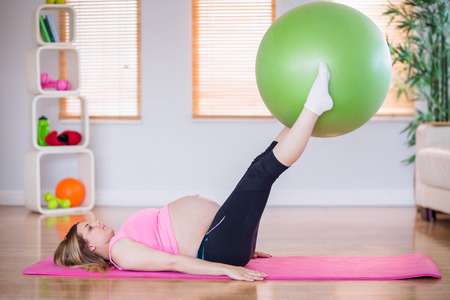Pregnancy Fitness

In this article, you will find:
Staying active while pregnant
Pregnancy Fitness
Athletic activity is a regular part of many expectant mothers' lives. During pregnancy, physical fitness activities provided multiple benefits to body and mind: the enjoyment of the activity, better fitness and health, weight management, stress management, improved mood, and body benefits, including improved strength and decreased pain. Exercise can make labor easier, decrease back pain, and make child care less tiring. Although there are some important changes you must make to protect your child, with modifications, most types of exercise can be continued throughout pregnancy.As with all aspects of pregnancy, there are many factors of which you need to be aware, especially if this is your first pregnancy. Remember, pregnancy is the beginning of a new stage of your life. You are responsible not just for yourself, but also for a wonderful child. This child's well-being and health depend on you. Using your skills in health management with exercise and fitness will preserve the health of both you and your baby.
Basic Guidelines
Once you suspect or know you are pregnant, you must start to listen to your body signals while exercising. Pay close attention to the four "F" fitness factors: fahrenheit, fluids, food, and fatigue. Ignoring these factors can cause problems with the development of your baby and the health of your pregnancy.
Fahrenheit
This refers to exercising in extreme temperatures. It is very important that you do not get overheated or feel hot while exercising. Your core body temperature actually rises while you exercise in extreme heat (over 80 degrees Fahrenheit). Problems with the neurological development of your baby can occur when your temperature goes up. For this reason, saunas, hot baths, and Jacuzzis are prohibited during pregnancy. This is particularly important during the first trimester. High temperatures also accelerate dehydration, another health risk during pregnancy.
Fluids
To avoid dehydration, a cause of early labor, make sure you are drinking plenty of fluidsabout two cups a day more than before. During exercise, always have water or a sports drink available. You should sip at least every 10 minutes, and drink 1 cup for every 20 minutes of exercise. Your blood volume increases significantly with pregnancy and requires more fluids to maintain it.
Food
Because pregnancy is a higher state of metabolism and you burn sugars quicker than normal, you must provide your growing baby and yourself with enough fuel at all times. Before exercising, make sure you have eaten within the past two hours, and have a snack within the half hour after. If you are exercising for longer than one hour, it is recommended that you take a break and have a carbohydrate snack at least every half-hour during activity.
Fatigue
Because your baby's development depends solely on your body, it is much easier to feel fatigued during exercise. Do not push yourself through this. Stop when you feel tired, and especially if you are light-headed or short of breath. You might only be able to do one-third or one-half the exercise you did when you were not pregnant; some days, especially if you are active all day, you might not have energy to exercise at all. Rest if you are tired, and do not push your exercise to extremes. On these days, instead of a hard workout, consider a 20-minute walk, a gentle yoga class, or easy cycling. Sometimes, what you might really need is a nap.
The Four "F" Fitness Factors to Consider While Exercising During Pregnancy
| Factor | What to Consider | Detail |
| Fahrenheit | Avoid high temperatures. | You should never exercise or even relax in heat or temperatures above 90 degrees. Saunas, hot baths, and Jacuzzis are prohibited. |
| Fluids | Drink plenty! | You should never let yourself feel thirsty to prevent dehydration. |
| Food | Food is your fuel and is used up more quickly in pregnancy. | During pregnancy, you use up your body fuel stores faster; a carbohydrate snack should be eaten within a half hour of exercise and during exercise longer than one hour. |
| Fatigue | Rest is essential to your developing baby. | Fatigue is your body telling you that you need rest. Listen to your body and modify (or skip) your workout when you feel you need rest. |